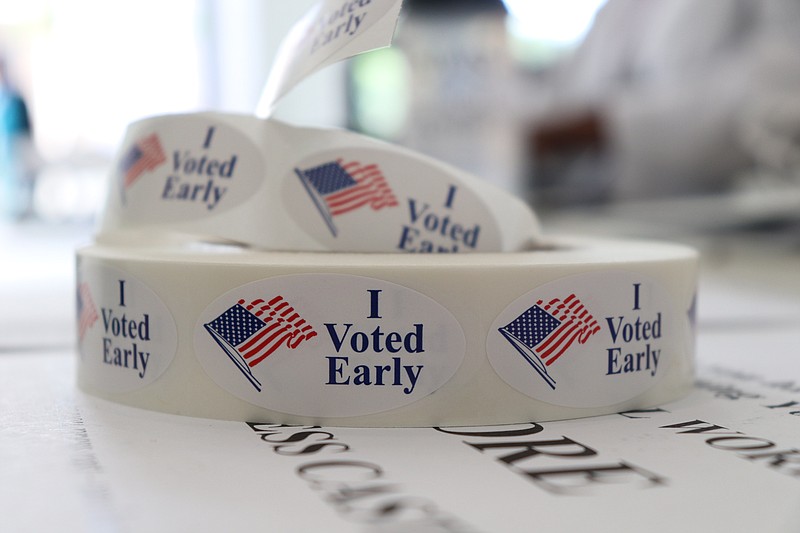If you feel as though the world of politics just gets weirder and weirder, you're not alone.
What are we to make of these two seemingly divergent political indicators?
1) Trump's approval rating average continues to hover at about 43 percent, according to realclearpolitics.com, despite his most disastrous fortnight ever - including a fawning meeting with the Russian president, ever-growing evidence that his campaign knew about and didn't turn away Russian meddling to help him win the election, and the release of a Michael Cohen-made tape recording with the president - proving Trump did know about pre-election hush money payments to at least one of the women claiming to have an affair with him.
Additionally, Trump's last-minute support this week of Georgia gubernatorial primary candidate Brian Kemp apparently propelled that far-right candidate from a tight race to a whopping 40-point win.
2) Democrats are gaining steam - and seem to be in a good position - to take the House and perhaps the Senate in the 2018 midterm elections, according to a preponderance of recent polls and veteran conservative analyst Larry Sabato's Crystal Ball.
Both Quinnipiac University and the Kaiser Family Foundation found Democrats with a 12-point lead in the generic congressional ballot - well above what political scientists think they need (seven points or so) to win back the House. Sabato on Tuesday changed his ratings for 17 House districts, moving all of them in favor of Democrats.
Frankly, we're finding it hard to connect these dots.
The president - despite continuing gaffes - remains fairly even in the polls and remains ridiculously popular with Republicans. Among GOPers, his approval rating is about 88 percent.
Of course, political analysts remind us that the slice of Republicans from which that 88 percent comes is shrinking.
Slate Magazine notes that voters' political party identification isn't stable; it ebbs and flows with events and circumstances. Trump might win high marks from most Republicans, but the pool of Republican voters might be smaller than in the past.
What's more, even within the Republican Party, Trump's base may have eroded significantly.
According to the Pew Research Center, Republican Party identification fell 3 points, to 26 percent, from 2016 to the end of 2017. The number of self-identified independents increased at the same time, from 34 percent to 37 percent, while the number of Democrats remained steady. Gallup shows a similar change: a five-point drop in the number of people who called themselves Republicans, from 42 percent to 37 percent. Democratic self-identification remained unchanged at 44 percent.
Slate writes: "The sheer size of the United States makes it easy to find vocal support for anyone and anything, and Donald Trump has his vocal supporters. But their staunch commitment overshadows the reality: a shrinking base for a president who won by the skin of his teeth, reliant on a small group of voters in just a handful of states. His scandals and outrages - controversies and improprieties - have had an effect."
Panelists on "Morning Joe" this week talked about that effect and another recent poll finding - that while a majority of Republicans gave Trump an "approve," they did not in a later answer want him to be president for another term.
That poll - looking only at the three Midwestern states that went red for Trump in 2016 - found the kind of decided shift that Slate Magazine talked about. In Michigan, only 28 percent said Trump deserves another term, and 62 percent said they wanted to give somebody else a chance. In Wisconsin, 63 percent of voters would give someone else a chance. In Minnesota, 60 percent would go for someone new.
Here are some additional recent polling reveals: A hefty majority of Americans believe the Russians meddled in our 2016 election - despite the president's continued protests that the Russia probe is "a witch hunt," and more than two-thirds think the Mueller probe should be allowed to continue to its end. In the Quinnipiac poll released Tuesday, 51 percent said they believe the Russian government has compromising information about Trump and 73 percent said the Helsinki summit was a success for Russia while only 8 percent thought it was good for America. An astonishing 54 percent said Trump was not acting in the best interest of the U.S.
Yet he tweets for Georgia candidate Brian Kemp, and Kemp's election is a runaway.
Perhaps we can chalk it up to regional differences. This is the South, after all, and that was just a primary election run-off.
November will tell the tale.
In the polls, even Tennessee is a toss-up state this year for governor and Senate. And Georgia Democrats already have made history, nominating the first African-American woman as their candidate for governor: Stacy Abrams will face-off against Trump's pick, Kemp, in a general election test of just how blue we can go.
